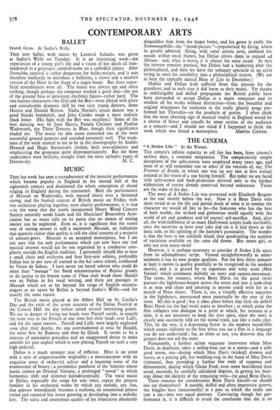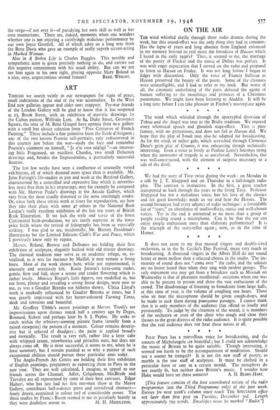THE CINEMA
"A Stolen Life." At the Warner.
THE camera's infinite capacity to tell lies has bean, from cinema's earliest days, a constant temptation. The comparatively simple deceptions of the split-screen were employed many years ago, and most of us will remember one or other of the versions of, say, The Prisoner of Zenda, in which one was (at any rate at first seeing) amazed at the vision of a star facing himself. But today we are faced with split-screen and back-projection devoted only to the further elaboration of stories already contrived beyond endurance. Twins are the order of the day.
The story of A Stolen Life was presented with Elizabeth Bergner as the star shortly before the war. Now it is Bette Davis who must reveal to us the life and partial death of what is in essence the character we would all like to be—the Someone who has the best of both worlds, the wicked and glamorous world equally with the world of art and goodness and (of course) self-sacrifice. And, after all, the wish-fulfilment of so many Hollywood scripts leads inevitably, once the necessity to have your cake and eat it is laid down as the basic rule, to the splitting of the heroine's personality. The wonder is that the hero is not similarly sliced, thus quadrupling the number of variations available on the same old theme. Boy meets girl, so why not twin meets twin?
However, it is perhaps necessary to consider A Stolen Life apart from its schizophrenic script. Viewed straightforwardly as enter- tainment it has its own proper qualities. For the first thirty minutes at least it moves (a quality gratefully to be recognised in the modern movie), and it is graced by an ingenious and witty score (Max Steiner) which comments skilfully on story and camera-movement. The scene, for instance, where Bette Davis (as the good twin) pursues the lighthouse-keeper across the street and into a junk-shop is as neat and clean and amusing as anyone could wish for in a month of Press shows. There is, too, a visually effective sequence in the lighthouse, punctuated most punctually by the roar of the siren. All this is good; but it takes place before that little ole debbil Bette Davis (as the bad twin) starts to interfere; which point the film collapses into dialogue to a point at whic, for minutes at a time, it is not necessary to keep the eyes open, since the story is clearly and succinctly told on the sound track, just like a radio play. This, by the way, is a depressing factor in the modern sound-film which comes violently to the fore when you see a film in a language you do not understand ; for, as often as not, you discover that the picture does not tell the story. Fortunately, a further action sequence intervenes when Miss Davis, in duplicate, takes a sailing-boat out in a storm—and a jolly good storm, too—during which Miss Davis (wicked) drowns and leaves, as a parting gift, her wedding-ring in the hand of Miss Davis (virtuous), thus providing a further few reels of suspense and denouement, during which Glenn Ford, even more bewildered than usual, succeeds, by carefully calculated degrees, in getting his bear- ings about the identity of the remaining twin—the good Bette Davis.
There remains for consideration Bette Davis herself—or should one say themselves? A notable, skilful and often impressive actress, she boggles here (occasionally) at a part in which she really can tear a cat—into two equal portions. Convincing though her per- formance is, it is difficult to avoid the conclusion that she is on the verge—if not over it—of parodying her own skill as well as her own mannerisms. There are, indeed, moments when one wonders whether one is not enjoying a satisfyingly malicious performance by our own Joyce Grenfell. All of which takes us a long way from the Bette Davis who gave an example of really superb screen-acting in Marked Woman.
Also in A Stolen Life is Charles Ruggles. This notable and sympathetic actor is given precisely nothing to do, and carries out this negative commitment with his usual ability. But can we not see him again in his own right, playing opposite Mary Boland in a nice, cosy, unpretentious second feature? BASIL WRIGHT.



































 Previous page
Previous page